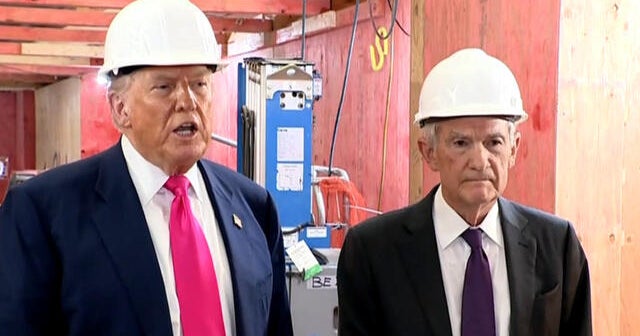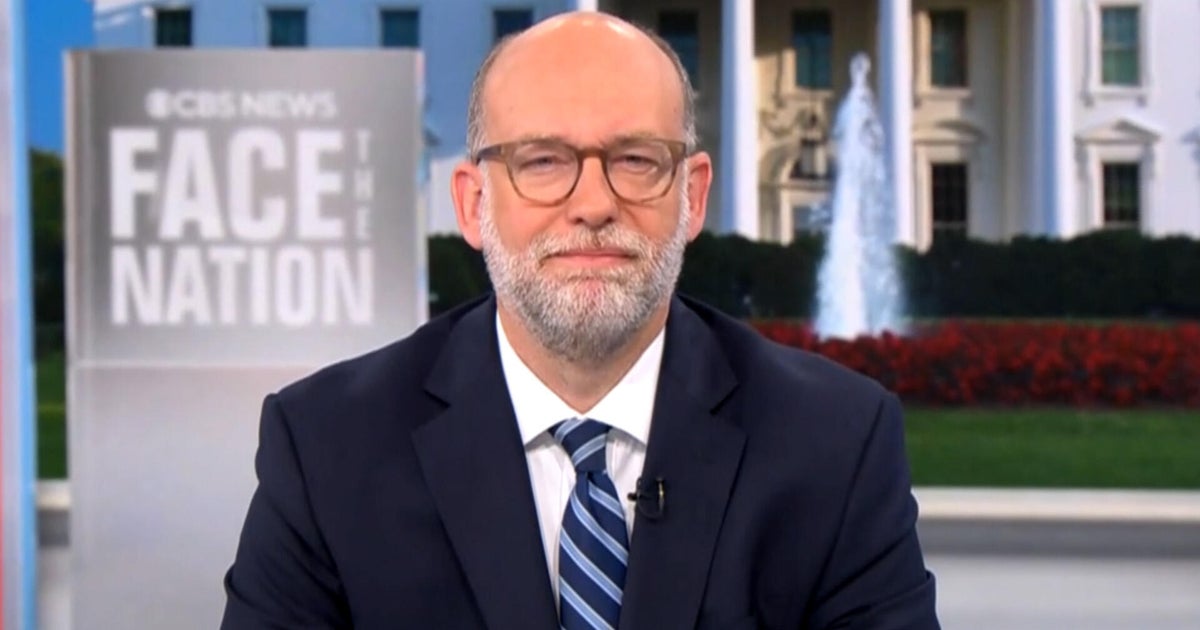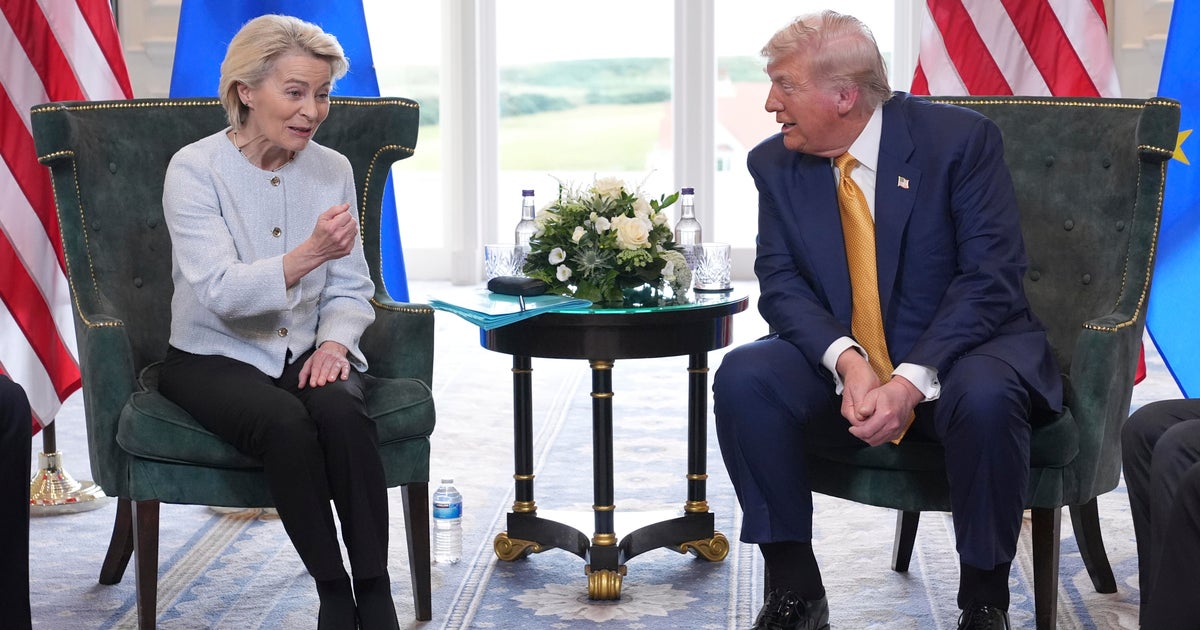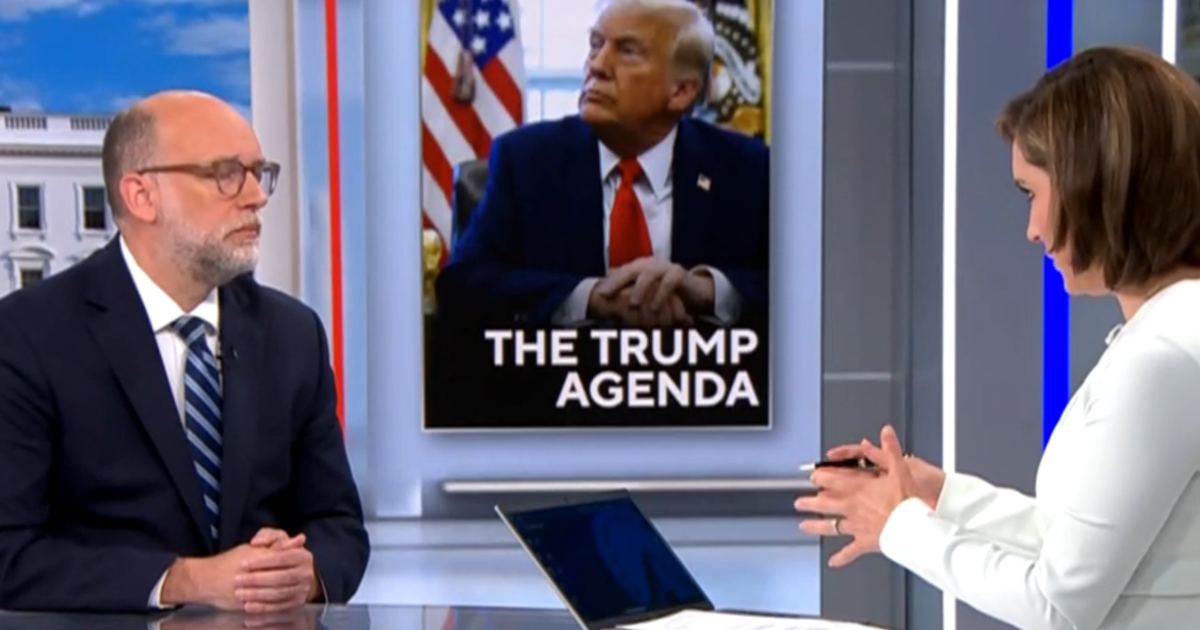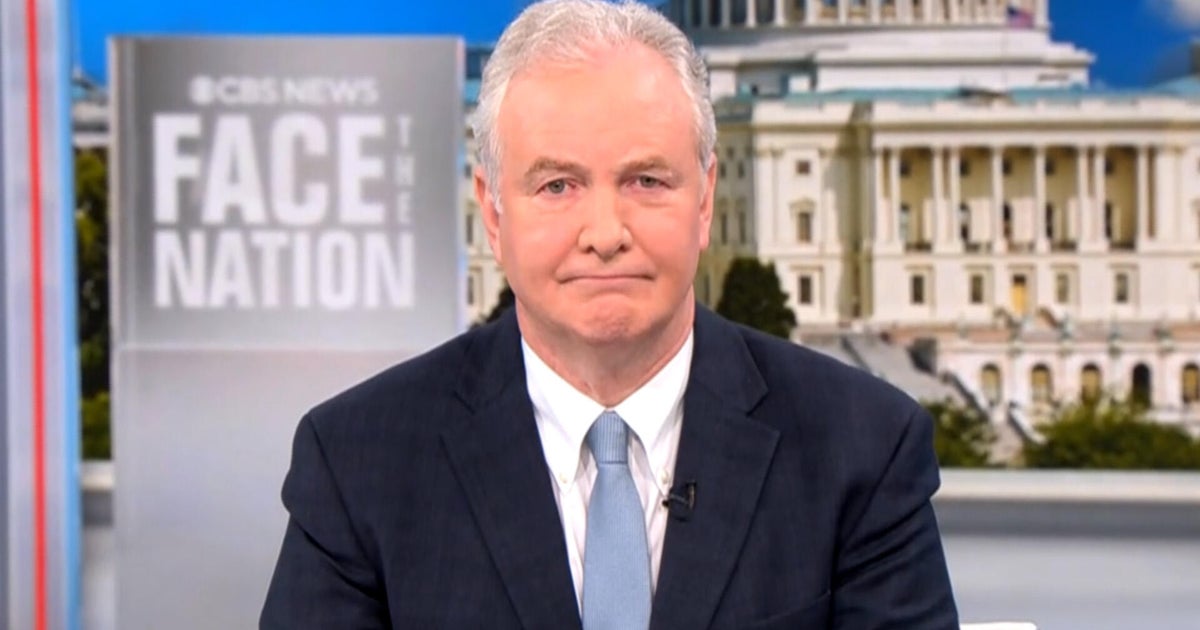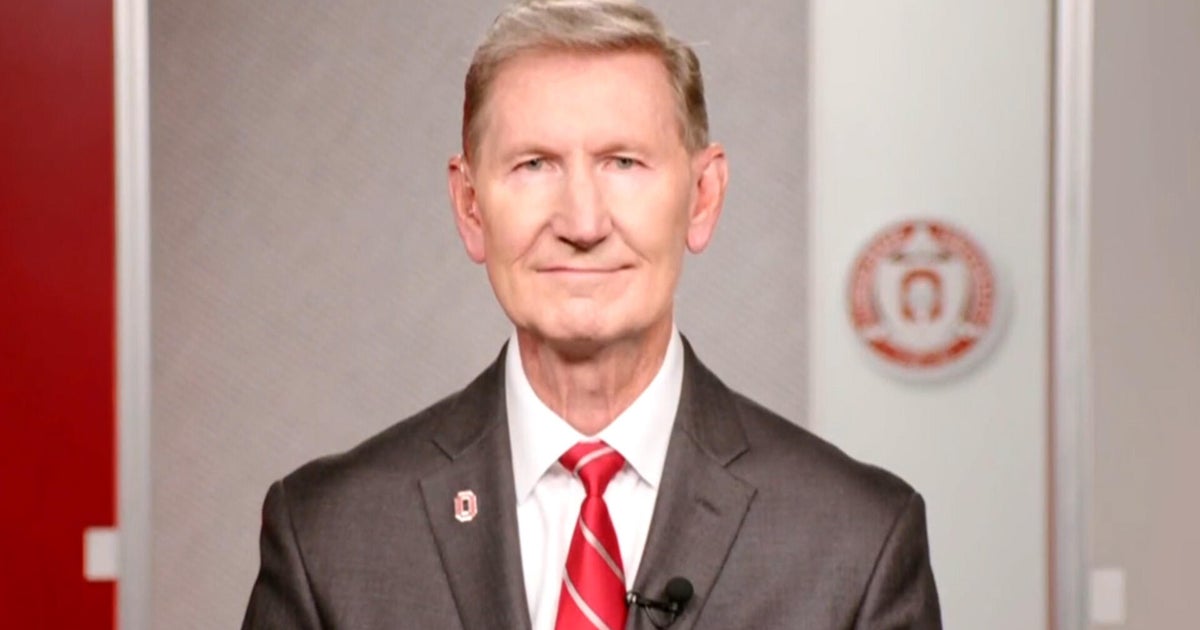Thai and Cambodian leaders are set to meet in Malaysia for talks to end border hostilities that have killed at least 34 people and displaced more than 168,000 over the last four days.
The talks, announced by a spokesperson for the Thai prime minister's office on Sunday, come after pressure from President Trump to reach a ceasefire.
Jirayu Huangsap said Acting Prime Minister Phumtham Wechayachai will attend Monday's talks in response to an invitation from Malaysian Prime Minister Anwar Ibrahim "to discuss peace efforts in the region." Anwar has been acting in his capacity as this year's chair of the 10-member Association of Southeast Asian Nations.
Cambodian Prime Minister Hun Manet late Sunday night on several social media platforms confirmed his participation as well.
"I will lead (the) Cambodian delegation to attend a special meeting in Kuala Lumpur hosted by Malaysia, co-organized by the United States and with participation of China," he said. China is a close ally of Cambodia, and had early in the fighting urged the two nations to resolve their differences peacefully, but Hun Manet's statement appeared to be the first mentioning a Chinese link to Monday's planned talks.
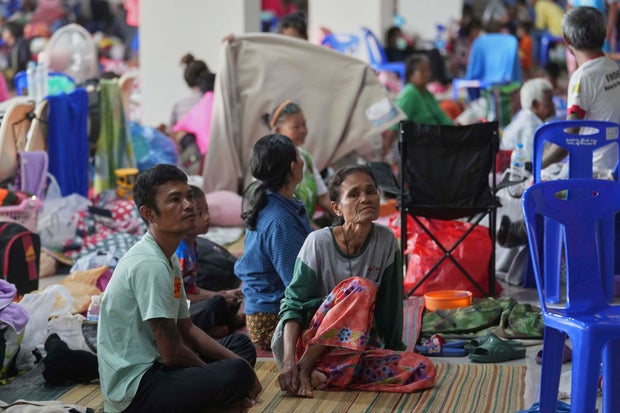 Thai residents who fled homes following clashes between Thai and Cambodian soldiers rest at an evacuation center in Surin province, Thailand, Sunday, July 27, 2025.
Sakchai Lalit / AP
Thai residents who fled homes following clashes between Thai and Cambodian soldiers rest at an evacuation center in Surin province, Thailand, Sunday, July 27, 2025.
Sakchai Lalit / AP
Mr. Trump posted on Truth Social on Saturday that he spoke to the leaders of Thailand and Cambodia and suggested he would not move forward with trade agreements with either country if the hostilities continued. He later said both sides agreed to meet to negotiate a ceasefire.
Cambodian Prime Minister Hun Manet said earlier Sunday his country agreed to pursue an "immediate and unconditional ceasefire." He said Mr. Trump told him that Thailand had also agreed to halt attacks following the U.S. president's conversation with Phumtham.
He said he tasked his deputy, Foreign Minister Prak Sokhonn, to coordinate next steps with U.S. Secretary of State Marco Rubio and to engage directly with Thailand's foreign minister to implement the ceasefire.
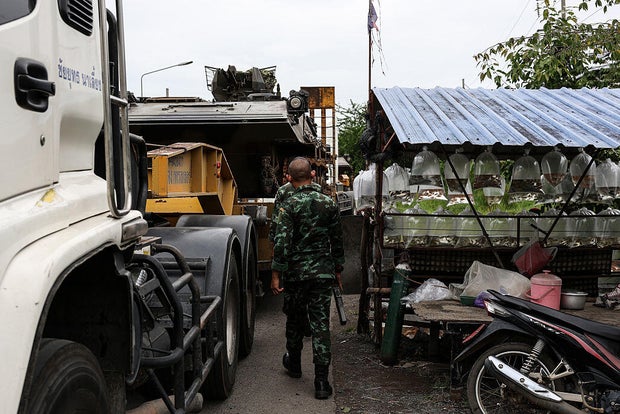 A Thai military officer walks past trucks transporting Chinese-produced Type 85 Armored Fighting Vehicles (AFV) amid the escalating conflict between Thailand and Cambodia in Surin, Thailand, July 26, 2025.
Valeria Mongelli/Anadolu via Getty Images
A Thai military officer walks past trucks transporting Chinese-produced Type 85 Armored Fighting Vehicles (AFV) amid the escalating conflict between Thailand and Cambodia in Surin, Thailand, July 26, 2025.
Valeria Mongelli/Anadolu via Getty Images
Rubio spoke with the foreign ministers of Cambodia and Thailand on Sunday, urging them to immediately de-escalate tensions and telling them the U.S. is ready to help with talks, the State Department said.
"Secretary Rubio reiterated President Trump's desire for peace and the importance of an immediate ceasefire," State Department spokesperson Tammy Bruce said in a statement. "The United States is prepared to facilitate future discussions in order to ensure peace and stability between Thailand and Cambodia."
The fighting flared Thursday after a land mine explosion along the border wounded five Thai soldiers. Both sides blamed each other for starting the clashes and recalled their ambassadors. Thailand also closed its border crossings with Cambodia.
Despite the U.S. diplomatic intervention, fighting continued Sunday along parts of the contested border, with the two neighbors again trading blame over renewed shelling and troop movements.
Col. Richa Suksowanont, a Thai army deputy spokesperson, said Cambodian forces had fired heavy artillery into Surin province, including at civilian homes, early Sunday. He said Cambodia also launched rocket attacks targeting the ancient Ta Muen Thom temple, claimed by both countries, and other areas in a bid to reclaim territory secured by Thai troops. Thai forces responded with long-range artillery, saying they were targeting Cambodian artillery and rocket launchers.
Thai spokesperson Col. Richa said Mr. Trump's efforts to mediate were a "separate matter." Battlefield operations would continue, he said, adding that a ceasefire could only happen if Cambodia formally initiates negotiations.
"Any cessation of hostilities cannot be reached while Cambodia is severely lacking in good faith and repeatedly violating the basic principles of human rights and humanitarian law," Thailand's Foreign Ministry said separately.
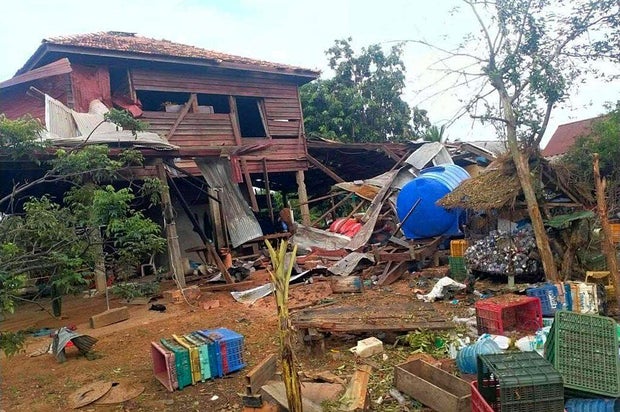 This photo shows a villager's house damaged by Thai artillery in Cambodia's Oddar Meanchey province.
-/POOL/AFP via Getty Images
This photo shows a villager's house damaged by Thai artillery in Cambodia's Oddar Meanchey province.
-/POOL/AFP via Getty Images
Cambodian Defense Ministry spokesperson Lt. Gen. Maly Socheata accused Thai forces of escalating the violence with what he said was their bombardment of Cambodian territory early Sunday, followed by what he called a "large-scale incursion" involving tanks and ground troops in multiple areas.
"Such actions undermine all efforts toward peaceful resolution and expose Thailand's clear intent to escalate rather than de-escalate the conflict," she said.
Thailand on Sunday reported the death of a soldier, bringing the total number of fatalities to 21, mostly civilians. Cambodia said 13 people have been killed on its side. More than 131,000 people in Thailand have evacuated to safe locations and over 37,000 people fled from three Cambodian provinces. Many border villages are mostly deserted, with many schools and hospitals shut.
The 800-kilometer (500-mile) frontier between Thailand and Cambodia has been disputed for decades, but past confrontations have been limited and brief. The latest tensions erupted in May when a Cambodian soldier was killed in a confrontation that created a diplomatic rift and roiled Thailand's domestic politics.


